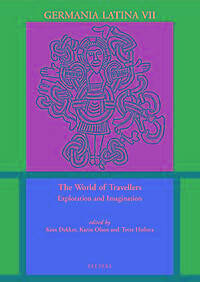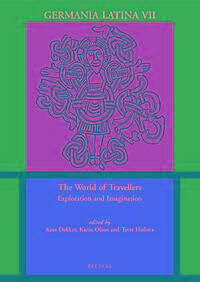
Je cadeautjes zeker op tijd in huis hebben voor de feestdagen? Kom langs in onze winkels en vind het perfecte geschenk!
- Afhalen na 1 uur in een winkel met voorraad
- Gratis thuislevering in België vanaf € 30
- Ruim aanbod met 7 miljoen producten
Je cadeautjes zeker op tijd in huis hebben voor de feestdagen? Kom langs in onze winkels en vind het perfecte geschenk!
- Afhalen na 1 uur in een winkel met voorraad
- Gratis thuislevering in België vanaf € 30
- Ruim aanbod met 7 miljoen producten
Zoeken
The World of Travellers
Exploration and Imagination: Germania Latina VII
Olsen K.E. Dekker K., T. Hofstra
€ 88,95
+ 177 punten
Omschrijving
Travel has always been a favourite human concern. Throughout the centuries, fascination with the unfamiliar or even unknown has turned many people into geographers, explorers, and writers of travel fiction. In the early Middle Ages, a great variety of travel accounts were accordingly appropriated, translated, recontextualised, and ultimately found their way into the literary production of Germanic Europe. The interest in distant countries and peoples was complemented by spiritual concerns, such as one finds in the accounts of early pilgrims to the Holy Land. The key words in the title of this book, 'exploration and imagination', imply that travel meant more than visiting foreign places and peoples. As with modern fantasy and science fiction literature, travel could also stimulate the imagination, especially in cases when perilous physical journeys were enhanced by imagined travel. Such accounts were rich in descriptions of the physical world, but they lent themselves equally to the relation of spiritual journeys. As a result, modern out-of-body experience finds its medieval counterpart in the journeyings and adventures of the human soul within a metaphysical and eschatological perspective. Finally, imagery travel may also be purely intellectual. The articles in this volume address the categories of travel outlined above in the light of the interface between the Latin and Germanic traditions.
Specificaties
Betrokkenen
- Auteur(s):
- Uitgeverij:
Inhoud
- Aantal bladzijden:
- 188
- Taal:
- Engels
- Reeks:
- Reeksnummer:
- nr. 15
Eigenschappen
- Productcode (EAN):
- 9789042921986
- Verschijningsdatum:
- 7/09/2009
- Uitvoering:
- Paperback
- Formaat:
- Trade paperback (VS)
- Afmetingen:
- 168 mm x 236 mm
- Gewicht:
- 498 g

Alleen bij Standaard Boekhandel
+ 177 punten op je klantenkaart van Standaard Boekhandel
Beoordelingen
We publiceren alleen reviews die voldoen aan de voorwaarden voor reviews. Bekijk onze voorwaarden voor reviews.









